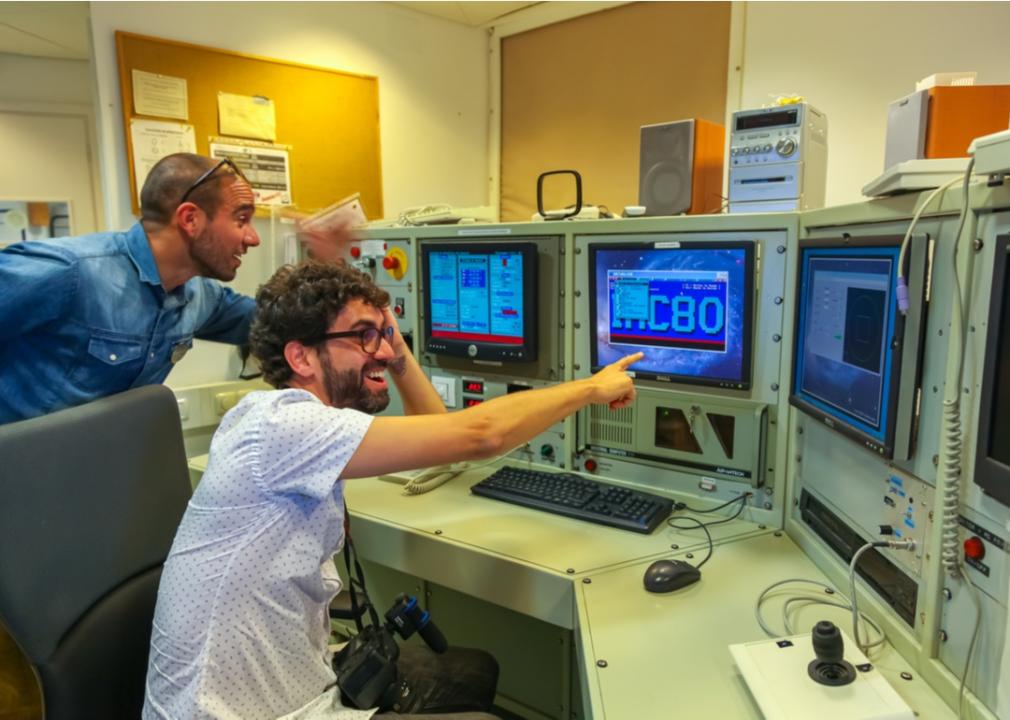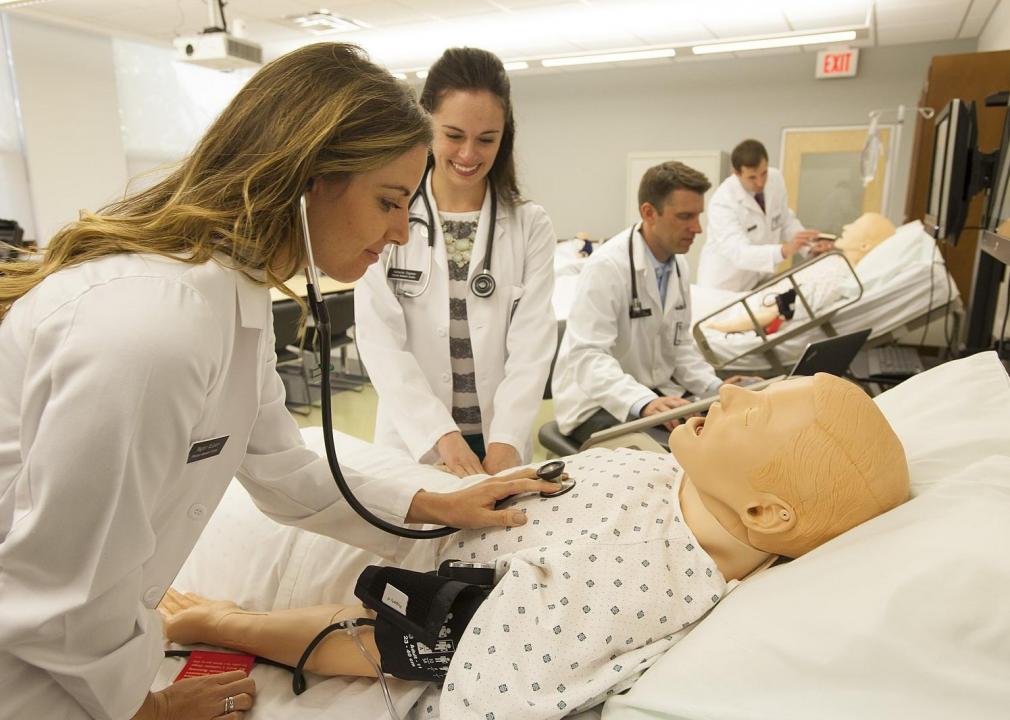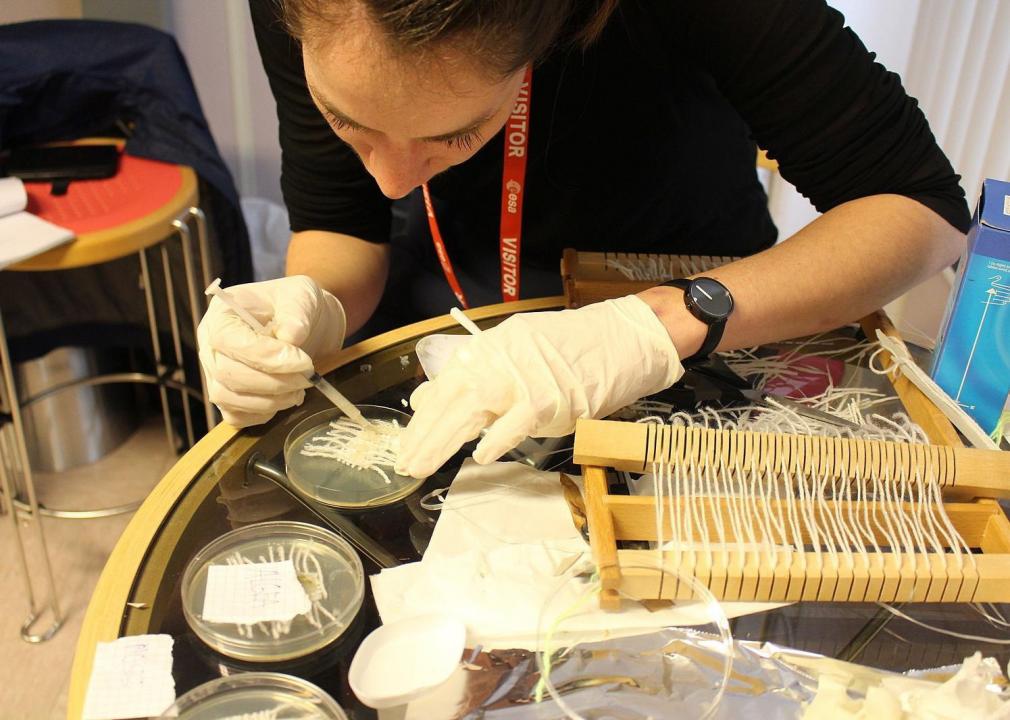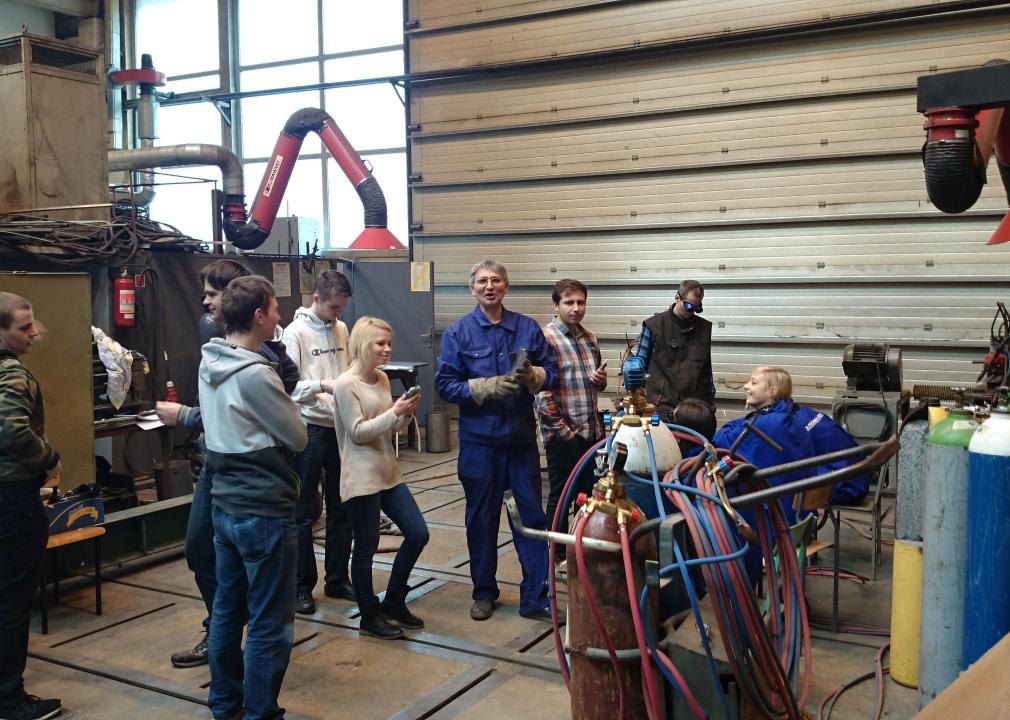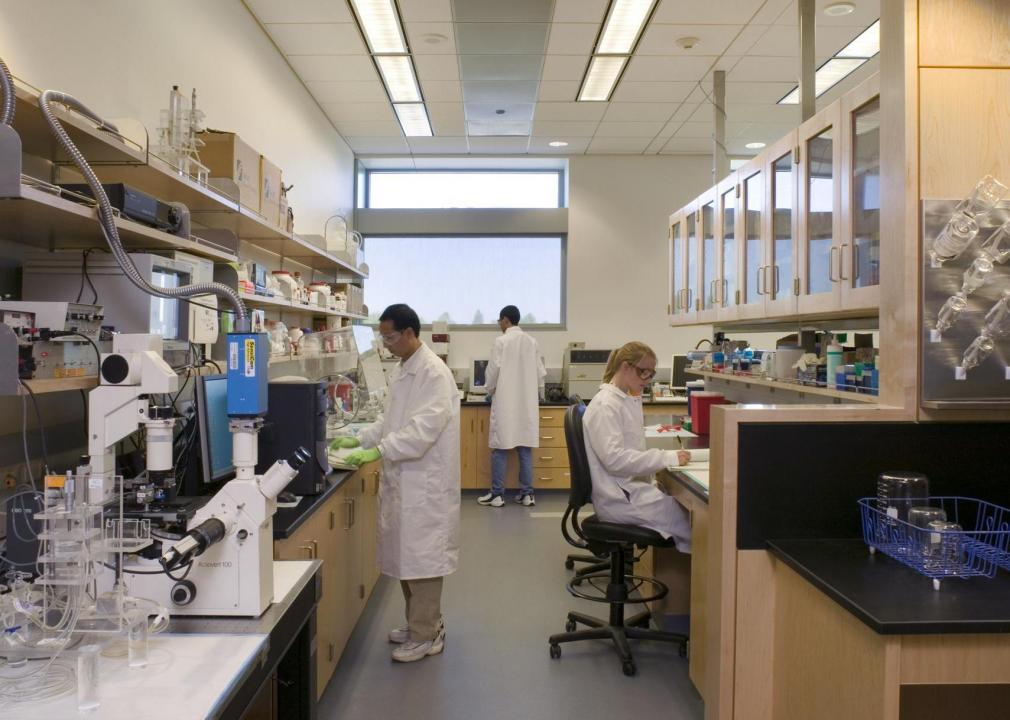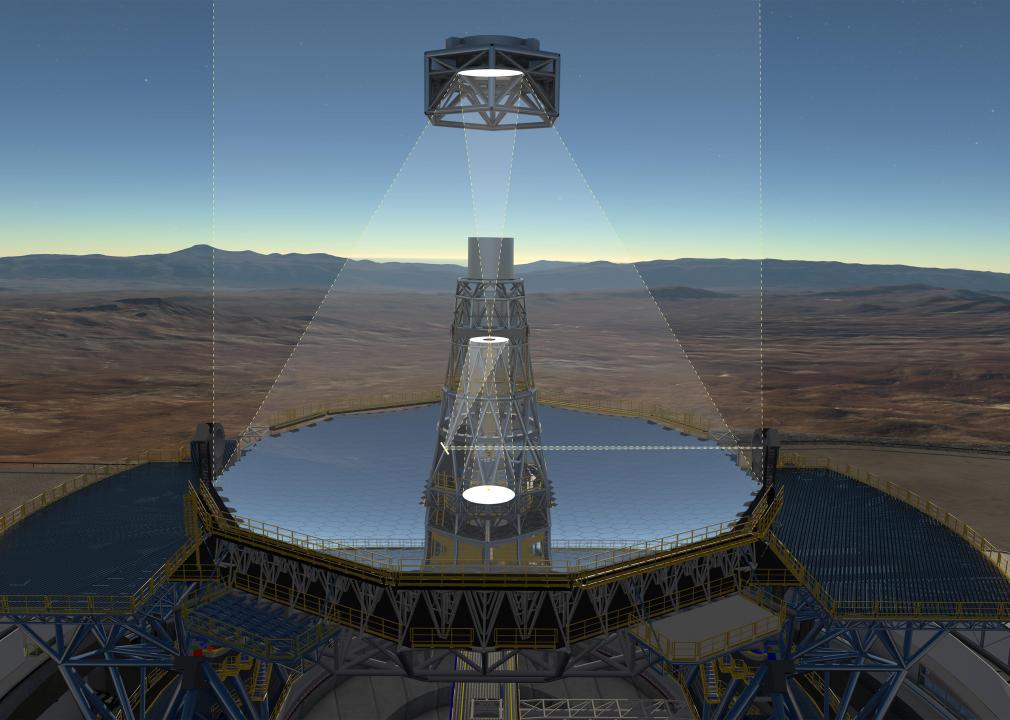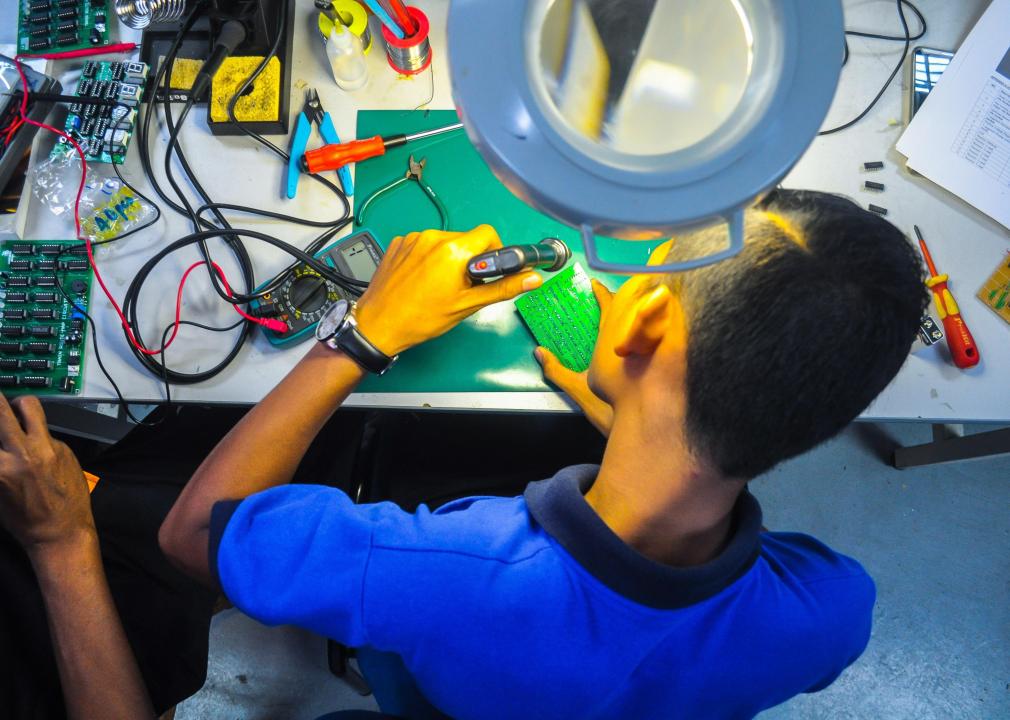College majors that earn the most money
Published 3:30 pm Thursday, July 7, 2022
Canva
College majors that earn the most money
Choosing a college major is a big decision. Students must decide to study something that challenges and interests them while balancing the hard realities of the job market and outlook on career paths. A good salary coming out of college is key to a financially secure future, and with increasing student loan debts, choosing a major that yields bigger salaries out the gate becomes even more desirable.
To show just how valuable some college majors can be, Stacker used data from a 2020 PayScale report to rank the top 100 college majors that alumni make the most money from in their respective professional careers.
The rankings, released in 2021, are based on the highest average mid-career salary. For each major, information is provided about potential jobs, the skills students will attain in school, and Bureau of Labor Statistics projections regarding the likelihood of finding a job upon graduation with a bachelor’s degree.
Keep reading to find out if your major made the list of college majors that earn the most money.
You may also like: 100 highest-paying jobs in America
![]()
Canva
#100. Electronics Engineering
– Early career pay: $69,600
– Mid-career pay: $113,900
– Share of alumni who say their work makes the world a better place: 66%
Electronics engineering focuses on the design and development of electronic devices, including phones, music players, and GPS systems. Majors will be taught the ins and outs of digital systems design and circuit theory, and adding drafting courses enhances a graduate’s employability. The slowing of the manufacturing and telecommunications industries has the profession projected to grow by only 2% in the next decade, according to the Bureau of Labor Statistics.
Canva
#99. Management Information Systems
– Early career pay: $65,000
– Mid-career pay: $114,100
– Share of alumni who say their work makes the world a better place: 42%
It is the role of an information systems manager to make data accessible and actionable through technology. This line of work requires problem-solving and analysis to find ways in which businesses can more efficiently make connections between data and the product or services they provide. Required coursework often merges multiple areas of discipline including mathematics, computer science, business, and ethics.
Shutterstock
#98. Industrial Distribution
– Early career pay: $63,600
– Mid-career pay: $115,000
– Share of alumni who say their work makes the world a better place: 48%
International sales manager, retail buyer, and regional sales director are a few career choices for industrial distribution majors who study the purchase and transport of goods. Program coursework required for this career includes communications, domestic and international marketing, analysis, operations management, wholesale purchasing, and distribution supervision. Professionals in the field have strong math and problem-solving skills.
mark reinstein // Shutterstock
#96. Asian Studies (tie)
– Early career pay: $47,700
– Mid-career pay: $115,100
– Share of alumni who say their work makes the world a better place: 41%
Asian studies majors explore the history, economy, culture, and politics of the continent of Asia. This broad knowledge and context positions graduates for careers in government, international relations, non-governmental organizations, and the private sector.
Canva
#96. Structural Engineering (tie)
– Early career pay: $67,800
– Mid-career pay: $115,100
– Share of alumni who say their work makes the world a better place: 66%
Considered a specialty within civil engineering, majors in this field concentrate on the design and structure of buildings, bridges, and roadways. Both a college degree and a professional engineer’s license are required to practice, which requires an understanding of physics, math, and material properties. During their careers, structural engineers work alongside architects and construction officials to determine design safety in the face of elemental forces, including snow, wind, and earthquakes.
You may also like: Most liberal colleges in America
Canva
#93. Information and Decision Sciences (tie)
– Early career pay: $65,200
– Mid-career pay: $115,200
– Share of alumni who say their work makes the world a better place: 33%
By combining technology and business, a major in information and decision sciences can attain the title of business analyst, data quality specialist, and business intelligence developer, among others. Graduates gain skills to analyze emerging technologies, use computer programs, and design and update operating systems.
Canva
#93. Materials Engineering (tie)
– Early career pay: $72,300
– Mid-career pay: $115,200
– Share of alumni who say their work makes the world a better place: 58%
Though the job outlook for college majors with a materials engineering degree is slight, growing 2% between 2019–2029, the early to mid-career pay ranks as one of the highest for young professionals. According to the Bureau of Labor Statistics, the 2020 median pay for professionals was $95,640 annually, equaling $45.98 per hour. College majors learn how to design and test materials for the creation of products.
LI CHAOSHU // Shutterstock
#93. Paper Science (tie)
– Early career pay: $77,000
– Mid-career pay: $115,200
– Share of alumni who say their work makes the world a better place: 39%
Graduates in this major—which explains the science and technology of converting raw bio-materials into paper and new ways to manufacture the product—are well-versed in advanced math, chemistry, and physical and chemical properties of wood. Field, project, packaging, quality, and process engineer are some titles alums hold after graduating.
ShutterOK // Shutterstock
#92. Telecommunications Engineering
– Early career pay: $66,400
– Mid-career pay: $115,400
– Share of alumni who say their work makes the world a better place: 47%
Telecommunications engineering entails designing, maintaining, and troubleshooting data, voice, video, and image systems. Graduates have jobs setting up network systems or installing fiber optic cable and work for telecom companies, government agencies, or consulting firms. Available in associate, bachelor’s, or master’s degrees, majors in the subject learn computer programming and networking through studying digital electronics and satellite transmission, among other specialties.
Canva
#89. Ceramic Engineering (tie)
– Early career pay: $69,200
– Mid-career pay: $115,700
– Share of alumni who say their work makes the world a better place: data not available%
Ceramic engineers develop materials needed for defense systems, transportation, and environmental technology by working with ceramics, an inorganic material handled at high temperatures. By combining math and science, majors learn to invent and work with products through critical thinking and problem-solving. Those who pursue the degree have a strong interest in the practical application of physics and chemistry.
You may also like: Colleges with the best student life in every state
StFX // Wikimedia Commons
#89. Economics (tie)
– Early career pay: $62,000
– Mid-career pay: $115,700
– Share of alumni who say their work makes the world a better place: 41%
Collecting, analyzing, and forecasting data for specific market trends, including finance, labor, and agriculture, is what economics majors study. The Bureau of Labor Statistics projects up to an 8% growth in the field from 2018 to 2028 for economists, who most often hold a master’s degree or doctorate. Critical thinking, reading comprehension, and decision-making are required skills for students who take on a variety of tasks, including conducting research, compiling reports, and supervising projects.
Canva
#89. Pharmaceutical Sciences (tie)
– Early career pay: $52,800
– Mid-career pay: $115,700
– Share of alumni who say their work makes the world a better place: 69%
A pharmaceutical sciences degree program begins with coursework in chemistry, biology, physics, and math, and advances to more complex areas of study like drug design and manufacturing, research, and regulation. Graduates with a pharmaceutical sciences degree can find work in the private sector for biotech companies like Vertex or Regeneron, for government agencies like the FDA, in academia, or in pharmaceutical sales.
Shutterstock
#88. Business and Economics
– Early career pay: $59,600
– Mid-career pay: $116,200
– Share of alumni who say their work makes the world a better place: 46%
Business and economics, the study of trade and finance, is a double major that equips a graduate for several careers, including senior financial analyst, chief finance officer, and chief operating officer. Those with this double major find well-paying jobs in market research organizations, consulting firms, investment institutions, merger and acquisition departments, and insurance companies.
Canva
#87. International Economics
– Early career pay: $58,700
– Mid-career pay: $116,300
– Share of alumni who say their work makes the world a better place: 48%
International economics is the study of global trade and finance and its worldwide effect. By predicting production, transaction, and multilateral trade negotiations, majors in the subject become government or global organization analysts and consultants, or work in the finance industry. The Bureau of Labor Statistics reports most economics majors in the private sector have either a master’s degree or doctorate, but entry-level jobs in a federal agency only require a bachelor’s degree.
Great Pics – Ben Heine // Shutterstock
#86. Applied Physics
– Early career pay: $67,300
– Mid-career pay: $116,500
– Share of alumni who say their work makes the world a better place: 52%
Applied physics is the practical application of core physics concepts to solve a problem. For example, acoustic engineering—a type of applied physics—marries the study of sound and the need to create environments, like factories, which can regulate noise. There is no shortage of career opportunities for holders of an applied physics degree, particularly in the fields of fiber optics, semiconductors, and astrophysics, to name a few.
You may also like: Best big college towns in America
Canva
#85. Business and Information Technology
– Early career pay: $60,100
– Mid-career pay: $116,900
– Share of alumni who say their work makes the world a better place: 44%
While a computer forensic analyst averages more early career pay, a network architect makes even more than the mid-career pay for graduates of the major. The business end of the major teaches students finance, marketing, operating systems, and web administration. Students who attain a graduate business and information technology degree, and earn more annual pay, learn disaster recovery, managerial accounting, and systems project management.
Canva
#84. Accounting and Computer Systems
– Early career pay: $63,000
– Mid-career pay: $117,300
– Share of alumni who say their work makes the world a better place: 37%
This degree is an appropriate fit for people with passion for business and technology. With an accounting and computer systems degree, alumni often pursue certification as a certified public accountant. Graduates also have the additional skill set of deeply understanding software and databases frequently used in business. The Bureau of Labor Statistics reports a 12% expected job growth in the industry by 2028.
Canva
#81. Engineering Mechanics (tie)
– Early career pay: $75,500
– Mid-career pay: $117,400
– Share of alumni who say their work makes the world a better place: data not available%
A degree in engineering mechanics offers a variety of important postsecondary career opportunities. Combining both basic sciences and engineering sciences like thermodynamics, mechanics, electrical engineering, and engineering mechanics is essential in fields such as aerospace and engineering. Graduates most often find work as architectural and engineering managers, engineers, or engineering professors.
Canva
#81. Industrial Engineering (tie)
– Early career pay: $71,900
– Mid-career pay: $117,400
– Share of alumni who say their work makes the world a better place: 44%
An industrial engineering degree prepares graduates to oversee various aspects of large-scale projects, including quality control, labor, cost analysis, logistics, material flow, and more. The Bureau of Labor Statistics reports that many industrial engineers have a degree in a specific field, including mechanical engineering, electrical engineering, and manufacturing engineering. An expanding health care system will probably produce higher demand for industrial engineers in professional, scientific, and consulting businesses.
Canva
#81. International Business and Finance (tie)
– Early career pay: $61,400
– Mid-career pay: $117,400
– Share of alumni who say their work makes the world a better place: 31%
International business and finance majors learn to manage money on a worldwide scale. By learning international law, corporate governance, and capital markets, majors can become venture capitalists, management consultants, investment bankers, financial accountants, and financial analysts. The Bureau of Labor Statistics reports that business and financial employment is growing faster than the average for all jobs, with an expected 7% growth between 2018–2028.
You may also like: Colleges that are richer than some countries
nevodka // Shutterstock
#80. Materials Science and Engineering
– Early career pay: $72,700
– Mid-career pay: $117,500
– Share of alumni who say their work makes the world a better place: 47%
A materials science and engineering degree combines the study of the structure and chemical properties of all types of materials, including metals, glass, polymers, graphites, plastics, and ceramics. While the Bureau of Labor Statistics separates materials scientists, who study substance interaction on atomic and molecular levels, from materials engineers, who develop and test substances, both professions earn a considerable median income.
Canva
#79. Mechanical Engineering
– Early career pay: $71,000
– Mid-career pay: $117,600
– Share of alumni who say their work makes the world a better place: 50%
Mechanical engineering is the design and development of tools, devices, and machinery, which requires strong science, math, mechanical, and critical thinking skills. The Bureau of Labor Statistics reports up to a 4% growth in mechanical engineering employment until 2028, such as in the automotive manufacturing industry. With a doctorate, mechanical engineers can participate in research and development programs as well as teach the subject at the university level.
Jat306 // Shutterstock
#78. Construction Engineering Management
– Early career pay: $68,800
– Mid-career pay: $118,200
– Share of alumni who say their work makes the world a better place: 57%
Offered at both undergraduate and graduate levels, construction engineering management is the combination of technology and science to reinforce construction framework on a wide range of large-scale projects, including airport design, roadways, bridges, and water waste management systems, or smaller residential and commercial structures. Majors who work in the field are well-versed in government codes, regulations, and laws for site inspections. They also have strong active listening and critical thinking skills to work with other officials.
Canva
#77. Mining Engineering
– Early career pay: $78,800
– Mid-career pay: $118,300
– Share of alumni who say their work makes the world a better place: 64%
Extracting coal and other metals in the safest manner is what mining engineering students are preparing for in their careers. Reduction in mining of coal, and businesses hiring engineering firms as opposed to employing their own, has growth projected at just 3% over the next decade. The future of mining may be beyond the confines of the planet, with the Colorado School of Mines being the first to offer a space resources course for extracting precious metals from asteroids and other bodies in outer space.
Ohiodominican // Wikimedia Commons
#76. Physician Assistant Studies
– Early career pay: $95,900
– Mid-career pay: $118,500
– Share of alumni who say their work makes the world a better place: 84%
Physician assistant studies prepare majors for a career in the medical field. The Bureau of Labor Statistics reports that most in the field require a master’s degree. This industry is forecasted to grow by up to 31% by 2028, making it an appealing choice for those interested in job security. Strong listening, critical thinking, and deductive and inductive reasoning skills are required for graduates, who become assistants in examining, testing, diagnosing, and treating patients.
You may also like: 50 best public colleges ranked from least to most expensive
Canva
#75. Accounting and Economics
– Early career pay: $65,900
– Mid-career pay: $118,900
– Share of alumni who say their work makes the world a better place: 44%
Double majoring in accounting and economics combines the accounting’s skills of preparing financial documents and tax statements with economics’ understanding of markets and forecasting future decisions. Both professions individually are expected to grow at, or slightly above, the national average, while combining them only enhances job prospects.
Canva
#74. Geophysics
– Early career pay: $58,000
– Mid-career pay: $119,000
– Share of alumni who say their work makes the world a better place: 47%
While a master’s degree is preferred among many employers, graduates with a bachelor’s degree in geophysics have a firm understanding of the planet’s physical properties and use physics to study the earth’s magnetic, gravitational, and electric fields. Emerging energy technologies, like wind and geothermal energies, will help keep geophysicists employed.
Canva
#73. Computer and Information Science
– Early career pay: $63,600
– Mid-career pay: $119,500
– Share of alumni who say their work makes the world a better place: 55%
Treating the computer as a tool to find innovative solutions to complex problems falls to the computer and information science grads. Students will leave with a firm grasp of network security, computer programming, and software design. The job market for those completing a four-year degree is strong, with careers in software development expected to grow 21% over the next 10 years.
Canva
#72. Quantitative Economics
– Early career pay: $65,000
– Mid-career pay: $119,600
– Share of alumni who say their work makes the world a better place: 43%
A specialized field of economics, quantitative economics incorporates statistics along with math to predict future economic conditions. The demand for economists is expected to grow slightly faster than average over the next decade, but the highly competitive nature of the field means grads should consider pursuing a master’s degree. Learning additional statistical analysis software can help those obtaining a bachelor’s degree enhance their job prospects.
Shutterstock
#71. Physics
– Early career pay: $65,900
– Mid-career pay: $119,700
– Share of alumni who say their work makes the world a better place: 48%
Understanding energy and matter and how they relate through space and time is the goal of those pursuing a degree in physics. There are plenty of options for graduates in physics, from teaching in a high school to understanding the origins of the universe. Students will graduate with skills in advanced math, quantum mechanics, electromagnetism, and thermodynamics.
You may also like: 50 best private colleges ranked from least to most expensive
Joonspoon // Wikimedia Commons
#70. Software Engineering
– Early career pay: $75,000
– Mid-career pay: $120,000
– Share of alumni who say their work makes the world a better place: 43%
Software engineering majors learn to develop programs for computers using principles of engineering. Learning a wide variety of computer languages and gaining certifications can help job candidates stand out from the pack. Becoming a software developer is one of the more lucrative career paths a graduate can take, with this field expected to grow by 21% over the next 10 years.
Canva
#69. Operations Management and Information Systems
– Early career pay: $66,100
– Mid-career pay: $120,900
– Share of alumni who say their work makes the world a better place: 38%
An operations management and information major will have strong skills in design systems, research, learning strategies, oral and written communication, math, and science. After graduation, majors who focus on production and operations management and information services can become inventory managers, materials controllers, and risk analysts.
Canva
#68. Integrated Science and Technology
– Early career pay: $65,200
– Mid-career pay: $121,100
– Share of alumni who say their work makes the world a better place: 56%
A bachelor’s degree in integrated science and technology holds several job titles, including software engineer and materials manager. After establishing a solid science foundation and its technology applications during the first two years of undergraduate studies, students then move on to more advanced learning, including applied biotechnology, environmental studies, production systems, networking, and telecommunications.
Canva
#67. Aeronautical/Aerospace Engineering Technology
– Early career pay: $76,900
– Mid-career pay: $121,200
– Share of alumni who say their work makes the world a better place: 53%
A degree in aeronautical/aerospace engineering technology teaches students the skills to design and build aircraft and spacecraft. Combining math, science, and engineering prepares graduates for careers in airframe design, logistics, or integration engineering. Growth in the field is projected to be sluggish due to the slowing of manufacturing.
astro_matt // Wikimedia Commons
#66. Bioengineering
– Early career pay: $70,900
– Mid-career pay: $121,300
– Share of alumni who say their work makes the world a better place: 67%
The study of biological systems and biomedical technologies, bioengineering is the leading concentration required to become a biomedical engineer. Students use math, engineering, and science to conduct experiments and design systems on a multidisciplinary level. This major is also available as a graduate degree, which leads to higher annual income.
You may also like: Best value public colleges in America
Wojciech Litwin // Wikimedia Commons
#65. Ocean Engineering
– Early career pay: $69,400
– Mid-career pay: $121,400
– Share of alumni who say their work makes the world a better place: 51%
Ocean engineers study the relationship and interaction between engineered systems and bodies of water. Unlike oceanographers, who study natural occurrences, engineers design vessels and instruments to explore the depths of the oceans, which are less understood than the surface of Mars. Knowledge of robotic design, underwater acoustics, and geomechanics are just a few of the skills graduates attain.
Canva
#64. Engineering
– Early career pay: $69,900
– Mid-career pay: $121,700
– Share of alumni who say their work makes the world a better place: 59%
A bachelor’s degree in engineering prepares students for a life designing, inspecting, and testing a wide variety of products, from airports to zippers. The median salary for an engineer in 2020 was $83,160. The demand for well-trained engineers is expected to accelerate in the coming years, as the country looks to update infrastructure and develop new energy systems.
Canva
#63. Materials Science
– Early career pay: $67,100
– Mid-career pay: $121,800
– Share of alumni who say their work makes the world a better place: data not available%
Materials science majors study materials such as rubbers, metals, and glass, and look for ways to strengthen them or bind them together to form stronger substances. Semiconductor manufacturing is among the most lucrative jobs for a materials scientist, while research and development employ the most professionals in the field. A large part of the curriculum is chemistry, which is used to study material at its most basic level to alter it to suit a need.
Canva
#62. Chemical and Biomolecular Engineering
– Early career pay: $76,800
– Mid-career pay: $121,900
– Share of alumni who say their work makes the world a better place: 48%
Fusing molecular biology, biophysical chemistry, and chemical engineering to create new products is the main area of expertise for a chemical and biomolecular engineer. Biomolecular engineers have a hand in everything, from life-saving pharmaceuticals to innovations in the food industry. This field is expected to see steady growth over the next decade.
Shutterstock
#61. Applied Mathematics
– Early career pay: $68,300
– Mid-career pay: $122,000
– Share of alumni who say their work makes the world a better place: 40%
Students in applied mathematics will learn how to use equations in their studies to find solutions to engineering and science problems. The field is expected to explode over the next decade, growing at a rate of 30%, bolstered by a surge in data storage. There are a wide range of fields to enter upon graduation, including finance, business, engineering, and government.
You may also like: Best private colleges in every state
indukas // Shutterstock
#60. Engineering Science
– Early career pay: $67,900
– Mid-career pay: $122,100
– Share of alumni who say their work makes the world a better place: 45%
Engineering science alumni become researchers, electronic technicians, and field engineers, among other related occupations. Common major courses include cell and molecular biology, nanoengineering, quantum electronics, and thermodynamics of materials. Engineering science graduates are guaranteed employment in several states, including Washington, Minnesota, Massachusetts, and Rhode Island.
Canva
#58. Aeronautical Science and Engineering (tie)
– Early career pay: $56,000
– Mid-career pay: $122,200
– Share of alumni who say their work makes the world a better place: 50%
Aeronautical Science and Engineering majors study the science of flight. Program alumni most often become pilots or engineers focused on the design and construction of aircraft. Those who choose to pursue a career as a pilot must also take separate lessons to earn a pilot’s license.
Shutterstock
#58. Metallurgical Engineering (tie)
– Early career pay: $81,800
– Mid-career pay: $122,200
– Share of alumni who say their work makes the world a better place: 61%
Transforming metal from ore into finished material falls under the direction of a metallurgical engineer. A subset of materials engineering, metallurgists can enhance their job prospects by taking computer modeling classes or gaining certifications. The field is expected to see little to no growth in the next decade—especially in manufacturing—while new medical and scientific products will help keep metallurgical engineers in demand.
Canva
#57. Business Analysis
– Early career pay: $63,200
– Mid-career pay: $122,300
– Share of alumni who say their work makes the world a better place: 46%
Efficiency is the primary goal of a graduate with a degree in business analysis, from improving software to streamlining production processes. The need for these professionals is expected to grow rapidly in the next decade—especially within the health care and IT fields—as more businesses look to control costs. Successful graduates take a range of classes, including math, business, finance, and IT.
Canva
#56. Pharmacology
– Early career pay: $57,700
– Mid-career pay: $122,700
– Share of alumni who say their work makes the world a better place: data not available%
Pharmacology majors become clinical research associates, staff nurses, and pharmacist technicians, among other related occupations. Drug interaction study involves several courses, including toxicology, pharmacokinetics, biochemical proliferation and differentiation, and apoptosis. The three top states for pharmacology majors are Delaware, Pennsylvania, and Alaska.
You may also like: 50 best colleges on the West Coast
Canva
#55. Control Engineering
– Early career pay: $69,700
– Mid-career pay: $122,800
– Share of alumni who say their work makes the world a better place: 61%
Control engineers combine math and mechanical engineering to design and implement automation or processing systems. Upon graduation, passing an exam to become an engineer-in-training is a must to get started. Control engineering is an offshoot of mechanical engineering, a field that is predicted to grow by 4% over the next decade. Keeping up with technological advances can help prospective employment.
Canva
#54. Electronics and Communications Engineering
– Early career pay: $67,400
– Mid-career pay: $122,900
– Share of alumni who say their work makes the world a better place: 51%
Electronics engineering covers the design and manufacturing of electronic devices, from smartphones and televisions, to GPS systems and portable music players. The curriculum will encompass math, physics, circuit theory, and systems design, opening the graduate up for jobs in computers and government, among others. While the career path is expected to grow more slowly than average over the next 10 years, the research and development of new technologies will drive much of that growth.
Canva
#52. Petroleum Land Management (tie)
– Early career pay: $59,300
– Mid-career pay: $123,100
– Share of alumni who say their work makes the world a better place: data not available%
Finding and buying land rights for oil and natural gas companies falls under the purview of petroleum land management. Professionals in this field discover ownership rights and negotiate leases or purchases for the purpose of drilling for oil. Knowing how to read zoning maps and investigate property deeds are two skills petroleum land managers will learn.
Canva
#52. Bioscience (tie)
– Early career pay: $49,200
– Mid-career pay: $123,100
– Share of alumni who say their work makes the world a better place: data not available%
Bioscience encompasses several majors, including marine biology, animal science, and biomedical engineering. Separating organic and inorganic solutions and DNA extraction are just two skills graduates will have, on top of extensive math, science, and lab work. Graduates can find work in a variety of fields, including genetic counseling, pharmaceutical sales, biochemistry, and more.
Canva
#50. Computer Science (tie)
– Early career pay: $75,100
– Mid-career pay: $123,400
– Share of alumni who say their work makes the world a better place: 42%
Computer science majors delve into the world of designing, developing, and applying computer software. Software development is a common career for a graduate with a computer science degree, a field that is expected to grow at 21% over the next decade, about four times the national average. A four-year degree will prepare grads with advanced math skills in calculus, statistics, and algorithms, as well as a slew of computer courses, including computer theory, information management, and design physics.
You may also like: 30 college majors that didn’t exist 50 years ago
Canva
#50. Physics and Astronomy (tie)
– Early career pay: $56,500
– Mid-career pay: $123,400
– Share of alumni who say their work makes the world a better place: 36%
While reaching the stars from a salary standpoint requires a doctorate, graduates with a bachelor’s degree in physics and astronomy can find work in a variety of fields, both within the government and private sectors. Coursework includes extensive math, statistics, and science training to learn how matter interacts with energy.
UC Davis College of Engineering // Wikimedia Commons
#48. Biomedical Engineering
– Early career pay: $71,300
– Mid-career pay: $123,600
– Share of alumni who say their work makes the world a better place: 72%
A degree in biomedical engineering entails taking many of the same courses needed to graduate from medical school. Biomedical engineering students can take several paths within the discipline, including medical imaging, nanotechnologies, genetic engineering, or prosthetics. An increasing aging population will help increase the demand for biomedical engineers.
Petekub // Shutterstock
#48. Managerial Economics
– Early career pay: $65,200
– Mid-career pay: $123,600
– Share of alumni who say their work makes the world a better place: 41%
Up to 6,270 managerial economic degrees were awarded during the U.S. 2018–2019 college year, making the major the 110th most popular. Courses for the major include accounting, calculus, econometrics, financial markets, economics of regulation, international trade, and money and banking. Graduates of the major find careers as financial managers and analysts, executive directors, and economists.
GaudiLab // Shutterstock
#47. Economics and Mathematics
– Early career pay: $68,200
– Mid-career pay: $124,100
– Share of alumni who say their work makes the world a better place: 35%
Mathematical economists solve complex economic problems using principles of algebra, calculus, and statistics, and form models to predict future performance. Mathematical economists rely on quantitative methods, and advanced knowledge of computer modeling can help set job candidates apart when looking for work in finance, government, or education.
Canva
#46. Industrial and Systems Engineering
– Early career pay: $73,100
– Mid-career pay: $124,800
– Share of alumni who say their work makes the world a better place: 48%
Industrial and systems engineering students specifically focus on productivity and quality improvement. They improve a business’ workflow by looking at people, product, and process to maximize efficiency. Employment in this sector is expected to grow 10% from 2019 to 2021, a rate above the national average, thanks to growing needs in the health care and automation industries.
You may also like: The most conservative public colleges in America
Shutterstock
#45. Computer Science and Mathematics
– Early career pay: $70,500
– Mid-career pay: $125,100
– Share of alumni who say their work makes the world a better place: 43%
Combining computer science and mathematics can lead to a lucrative career as a software developer, programmer, or research scientist. The job outlook for these majors is fairly strong, with the Bureau of Labor Statistics predicting 16% growth for researchers, and 21% for developers. Additional certifications can help enhance job prospects and boost starting salary.
Canva
#42. Astronomy (tie)
– Early career pay: $66,600
– Mid-career pay: $125,400
– Share of alumni who say their work makes the world a better place: 47%
Astronomy majors prepare to unlock the mysteries of the universe, and unlike most sciences where lab work is imperative, astronomers use mostly observation and math. Skills in physics, cosmology, and math are needed to observe, chart, and track celestial bodies as they move across the night sky. A bachelor’s degree in astronomy points graduates toward careers in fields like telescope operator or research assistant, while a doctorate is generally preferred to work in an academic setting as an astronomer.
ESO // Wikimedia Commons
#42. Optical Science and Engineering (tie)
– Early career pay: $71,000
– Mid-career pay: $125,400
– Share of alumni who say their work makes the world a better place: data not available%
A major in optical science and engineering goes on to a career in optical design, fabrication, instrumentation, and communications. Optical engineers must have strong skills in math, physics, manual dexterity, and problem-solving. They should also be versed in optical design/analysis tools, such as Zemax, Code V, or Trace Pro, and be able to use a variety of scientific and laboratory equipment.
Canva
#42. Quantitative Business Analysis (tie)
– Early career pay: $74,000
– Mid-career pay: $125,400
– Share of alumni who say their work makes the world a better place: 37%
Helping businesses make smart financial decisions by analyzing data falls under the purview of graduates with degrees in quantitative business analysis. Careers in this type of finance are in high demand, with the ability to value securities, identify investment opportunities, and even develop computer software. Graduates with a degree in the field will have a strong command of mathematics and statistics, while advanced computer skills are becoming more important for finding a higher-paying job.
Gorodenkoff // Shutterstock
#41. Aerospace Engineering
– Early career pay: $74,300
– Mid-career pay: $125,700
– Share of alumni who say their work makes the world a better place: 55%
Aerospace engineering prepares graduates to design aircraft, including planes, missiles, and satellites. A downturn in manufacturing dampens the job outlook for graduates with an aerospace engineering degree, but a push toward the development of smaller satellites and unmanned aircraft should help offset that. Seeking additional training in computer languages, as well as structural engineering, can help job prospects.
You may also like: Most conservative colleges in America
Canva
#40. Electrical and Electronics Engineering
– Early career pay: $74,700
– Mid-career pay: $125,800
– Share of alumni who say their work makes the world a better place: 56%
Learning how to design and manufacture electronic and electrical devices, along with computers and their components, is the goal of electrical and electronics engineering majors. Telecommunications, power generation, and the biomedical field are just a few of the career paths graduates can strive to attain. This job market is expected to slow in the next decade due to a downturn in manufacturing, but technological advancements and updates to the nation’s power grid should help offset losses.
Canva
#39. Computational and Applied Mathematics
– Early career pay: $75,500
– Mid-career pay: $126,000
– Share of alumni who say their work makes the world a better place: 45%
Computational and applied mathematics involves creating and using mathematical models to solve complex science and engineering problems. A strong foundation in math, science, and engineering is required for a graduate to find success in a wide range of potential careers, including actuaries, forensic science, and teaching.
Canva
#38. Instrumentation and Control Engineering
– Early career pay: $73,100
– Mid-career pay: $126,400
– Share of alumni who say their work makes the world a better place: data not available%
Instrumentation and control engineering majors will learn how to measure and control variables like temperature, pressure, and flow in a system. Knowledge of mathematics and physics, as well as engineering, are critical for success in the field. While the job outlook for engineers is declining, instrumentation engineers are critical to setting up and maintaining automated systems, which are always in demand.
Canva
#37. Welding Engineering
– Early career pay: $81,000
– Mid-career pay: $126,600
– Share of alumni who say their work makes the world a better place: 56%
Using heat and pressure to fuse two pieces of metal into one as a welding engineer requires skills in computer design, math, and chemistry, among others. After graduating, four years of work experience is required before taking a state licensure exam to become a professional engineer. Joining professional organizations—such as the American Welding Society or the Edison Welding Institute—can enhance job prospects for entry-level candidates, who can find work in shipyards, oil rigs, or research laboratories.
Canva
#36. Mechanical and Aeronautical Engineering
– Early career pay: $70,900
– Mid-career pay: $126,900
– Share of alumni who say their work makes the world a better place: 60%
Understanding how to build, fix, and maintain machinery falls to a mechanical engineer, while those who add aeronautical engineering to their major focus on airplanes, missiles, and weapons systems. Skills learned during this four-year degree include extensive math, physics, drafting, and computer courses. Both types of engineering are expected to grow at about the national average for the next decade, while combining the two can push a candidate to the top of the hiring list.
You may also like: Best value colleges in America
Canva
#35. Marine Transportation Management
– Early career pay: $71,100
– Mid-career pay: $127,500
– Share of alumni who say their work makes the world a better place: data not available%
Training officer, deck cadet, merchant marine, third mate, and seaman are some of the job titles these college majors have. Marine and other transportation management jobs have been on the uprise since 2004, averaging 0.41% growth annually. ZipRecruiter reports marine transportation jobs and annual salary vary, noting career growth is directly related to skill and location.
Shutterstock
#33. Electrical Engineering (tie)
– Early career pay: $75,600
– Mid-career pay: $127,700
– Share of alumni who say their work makes the world a better place: 54%
Electrical engineers design and maintain electrical equipment, and require extensive training in math, science, and engineering. Despite slower job growth than average, learning new technologies can give grads an advantage in the job market, as research and development provide steady work. Passing an exam to become an engineer-in-training is a must, while work experience and further state licensing are needed to become a professional engineer.
Canva
#33. Foreign Affairs (tie)
– Early career pay: $54,800
– Mid-career pay: $127,700
– Share of alumni who say their work makes the world a better place: 36%
Earning a degree in foreign affairs earns students knowledge of the ins and outs of foreign and domestic policy, including trade policy and public relations. Graduates can seek careers in government as diplomats or intelligence officers, or in the private sector working for international banks or businesses. Additional language skills are a plus for graduates seeking to reach the top of the applicant list.
Canva
#32. Nuclear Engineering
– Early career pay: $76,400
– Mid-career pay: $129,400
– Share of alumni who say their work makes the world a better place: 62%
Designing and developing instruments and equipment related to the harnessing of nuclear power and radiation falls to nuclear engineering professionals. Graduates can find work with the government, in construction, or within the medical field, while a third are employed in electric power generation. Knowledge of computer programs, like LINUX, Oracle Java, and C++, among others, can enhance job prospects and pay.
Canva
#31. Mechatronics
– Early career pay: $72,800
– Mid-career pay: $129,600
– Share of alumni who say their work makes the world a better place: 48%
When combined, mechanical and electrical engineering and computer science make up a mechatronics degree. As an engineering branch, the novel college major created in the 1960s teaches undergraduates how to build complicated systems. After graduation, college majors become mechatronics engineers, robotics engineers, and automation engineers.
You may also like: Best value big colleges in America
Canva
#30. Corporate Accounting and Finance
– Early career pay: $65,200
– Mid-career pay: $129,700
– Share of alumni who say their work makes the world a better place: 55%
Corporate accounting and finance majors primarily become financial managers for large-scale companies. Before becoming chief financial officers, graduates study capital budgeting, finance practicum, multinational financial management, and cost accounting, among other courses.
Canva
#29. Entrepreneurship and Marketing
– Early career pay: $51,400
– Mid-career pay: $129,800
– Share of alumni who say their work makes the world a better place: 45%
Building launch-ready businesses are what entrepreneurship and marketing majors do best. Required skills include product development, merchandise management, and business planning. From bootstrapping to brand-building, majors must be able to take financial risks with their own business ventures to succeed. New venture formation and buyer behavior are examples of courses majors study to graduate.
Tawansak // Shutterstock
#28. Naval Architecture and Marine Engineering
– Early career pay: $74,400
– Mid-career pay: $130,700
– Share of alumni who say their work makes the world a better place: 49%
In the simplest terms, the naval architecture and marine engineering program focus on the design and construction of ships. Alumni will have an understanding of concepts like hydrodynamics, fluid mechanics and thermodynamics, resistance and propulsion, and advanced engineering mathematics, among others. Alumni can find jobs in any industry involving floating vessels. According to Webb, a leading naval architecture and marine engineering program, their graduates have been hired by the U.S. Department of Energy, Carnival Cruise Lines, Chevron, and various military programs.
Shutterstock
#27. Computer Engineering
– Early career pay: $79,000
– Mid-career pay: $131,000
– Share of alumni who say their work makes the world a better place: 46%
A computer engineering degree fuses computer science with electronic engineering, leaving grads equipped to design, develop, and monitor systems. As more common household products integrate computers and microchips, the demand for computer engineers promises to increase over the next decade despite the slowing of manufacturing. Math, science, keeping up with emerging technologies, and ongoing accreditation is imperative to getting ahead in the job market.
Canva
#26. Aeronautical Engineering
– Early career pay: $74,700
– Mid-career pay: $131,100
– Share of alumni who say their work makes the world a better place: 66%
Aeronautical engineers focus on aircraft, studying their design and the effects of aerodynamics on performance. A subset of aerospace engineering, this profession will see slow growth in the next decade as manufacturing declines, but advances in fuel technology and reduction of noise pollution should help employment numbers. Additional training in software like C++, along with a focus on structural engineering, can help job prospects.
You may also like: Best community college in every state
Canva
#24. Computer Science and Engineering (tie)
– Early career pay: $79,400
– Mid-career pay: $131,300
– Share of alumni who say their work makes the world a better place: 44%
Combining computer science and engineering gets students ready for all aspects of building computer hardware and software. Focusing on software can offer better job prospects since the field is constantly changing, though hardware engineers make slightly more. Adding government clearances and professional certifications can enhance a graduate’s pay and chances of finding a job.
Canva
#24. Marine Engineering (tie)
– Early career pay: $79,900
– Mid-career pay: $131,300
– Share of alumni who say their work makes the world a better place: 60%
Marine engineering majors learn about all the internal components of a ship, from steering and power, to refrigeration and lighting. To graduate, students master aspects of calculus, chemistry, physics, mechanical engineering, and algebra. Over the next decade, there is a projected 1% growth rate for jobs as marine engineers, who often spend a semester on the water.
Canva
#23. Electrical and Computer Engineering
– Early career pay: $78,100
– Mid-career pay: $131,600
– Share of alumni who say their work makes the world a better place: 49%
Working on updated power grids, chemical sensors, and implantable devices are all tasks electrical and computer engineering majors perform. While the electrical side of the major teaches wireless communication and information processing, the computer side educates students on software verification and embedded systems. Job growth for the major until 2029 is expected to be 3%.
Canva
#22. Computer Systems Engineering
– Early career pay: $79,000
– Mid-career pay: $133,200
– Share of alumni who say their work makes the world a better place: 51%
How computers integrate into business and personal lives is the most important function of a computer systems engineer. To do that, these majors learn to combine skills in math, computer science, and engineering to examine and test circuits, software, and hardware. A good portion of the professionals in this field work in California.
Canva
#21. Political Economy
– Early career pay: $65,100
– Mid-career pay: $133,500
– Share of alumni who say their work makes the world a better place: 29%
A political economy degree program focuses on the intersection of politics, the economy, and how public policy is formed at that intersection. Some areas of career focus with this degree include social inequality, climate change, resource distribution, trade, and healthcare. Alumni often fill roles such as financial manager, lobbyist, and foreign policy specialist.
You may also like: Can you solve these real ‘Jeopardy!’ clues about college?
Shutterstock
#20. Actuarial Science
– Early career pay: $67,700
– Mid-career pay: $134,400
– Share of alumni who say their work makes the world a better place: 43%
Assessing risk within a particular industry falls under the purview of an actuarial science graduate, who uses math and statistics. Insurance companies are the primary employers of actuaries, who help create rates on premiums from life to car insurances. The field is expected to grow rapidly in the next decade, while adding business and analytics courses can help boost graduates’ prospects in what’s becoming a highly competitive job market.
Shutterstock
#19. Cognitive Science
– Early career pay: $68,700
– Mid-career pay: $135,200
– Share of alumni who say their work makes the world a better place: 42%
Cognitive science involves studying how the brain processes information, learns, and behaves. A wide range of potential careers awaits those with a bachelor’s degree in cognitive science, including marketing and teaching, as well as game and web development. Attaining a master’s degree or doctorate in the field can greatly enhance job prospects by honing skills like psychology, biology, and chemistry.
Canva
#17. Building Science (tie)
– Early career pay: $53,800
– Mid-career pay: $135,900
– Share of alumni who say their work makes the world a better place: 53%
Designing the next generation of buildings that meet the needs of safety, human comfort, and environmental demands is the goal of a building science major. This study combines the skills learned in architecture and construction management and building science majors can expect a job market projected to grow by 10% in the next decade. While a master’s degree is preferred to earn more, those with bachelor’s degrees will attain skills in economics, physics, and construction technology.
Canva
#17. Chemical Engineering (tie)
– Early career pay: $76,900
– Mid-career pay: $135,900
– Share of alumni who say their work makes the world a better place: 55%
Skills in math and multiple scientific disciplines are required for a career as a chemical engineer, and graduates will be prepared to tackle issues related to chemical manufacturing. Choosing to focus on a certain discipline, like nanomaterials or oxidation, can give job-seekers a bump in both prospects and pay, as the profession will grow at an average rate. A push toward domestic natural gas and oil will maintain the need for chemical engineers.
KenSoftTH // Shutterstock
#16. Aerospace Studies
– Early career pay: $55,800
– Mid-career pay: $136,600
– Share of alumni who say their work makes the world a better place: data not available%
Some majors in aerospace studies are preparing for a life in the Air Force, as coursework falls under the Air Force Reserve Officer Training Corps. Graduates are eligible to be commissioned as officers in the Air Force, which sought 3,500 officers to fill recruitment and instructor positions in 2019. Outside of recruiting or teaching, graduates learn about military planning, from developing national security policy to using air and spacecraft for strategic purposes.
You may also like: Best value private colleges in America
Canva
#15. Pharmacy
– Early career pay: $68,600
– Mid-career pay: $138,700
– Share of alumni who say their work makes the world a better place: 78%
Becoming a full-fledged pharmacist requires a bachelor’s degree and a doctorate in pharmacy. Four-year grads undertake an intensive study of biology and chemistry, while learning about the production and manufacture of pharmaceuticals. The need for professionals in this field is expected to increase rapidly over the next decade, as a growing elderly population creates a rise in demand within the health care industry.
Canva
#14. Econometrics
– Early career pay: $64,200
– Mid-career pay: $139,000
– Share of alumni who say their work makes the world a better place: 35%
Econometrics entails using existing financial data to either test existing economic hypotheses or predict future performance. Graduates can find work in a variety of fields, including banking, investment, government, and academics, with the Bureau of Labor Statistics predicting above-average job growth in the next decade.
Canva
#13. Systems Engineering
– Early career pay: $77,700
– Mid-career pay: $139,200
– Share of alumni who say their work makes the world a better place: 53%
Systems engineers will finish their four-year degree with the ability to build and manage complex systems, including people, equipment, and software for a variety of businesses. Aside from strong interpersonal and management skills, a systems engineer will possess high mathematics and information security acumen. The International Council on Systems Engineering offers a number of certifications for graduates to enhance their job prospects in this growing field.
ALPA PROD // Shutterstock
#12. Aeronautics and Astronautics
– Early career pay: $77,600
– Mid-career pay: $139,600
– Share of alumni who say their work makes the world a better place: 56%
Aeronautics and astronautics involve learning the design, manufacturing, and testing of everything that flies in the skies (aeronautics), and beyond the Earth’s atmosphere (astronautics). The job outlook for graduates with a degree in the field is average, with the Bureau of Labor Statistics projecting 3% growth by 2029. Proficiency in math, science, and engineering is a must for obtaining an entry-level position, while additional training in computer software can enhance an applicant’s prospects.
Canva
#11. Information and Computer Science
– Early career pay: $58,600
– Mid-career pay: $140,900
– Share of alumni who say their work makes the world a better place: 62%
Using both concrete and abstract principles, information and computer science majors learn to solve problems and explore new areas using computers. Graduates will leave school with the ability to create algorithms, understand different programming languages, and utilize artificial intelligence, data mining, and security skills. The need for these professionals is expected to grow at a rate well above the national average, although obtaining a master’s degree is a wise choice to further enhance job prospects.
You may also like: 100 best community colleges in America
Canva
#10. Electrical Power Engineering
– Early career pay: $76,100
– Mid-career pay: $142,600
– Share of alumni who say their work makes the world a better place: 68%
Designing, manufacturing, and maintaining electrical equipment are the fields of expertise for graduates with electrical power engineering degrees. A downturn in manufacturing and telecommunications will have an adverse effect on job prospects in the next decade, with the Bureau of Labor Statistics predicting only 3% growth. Students can get ahead by completing internships, and will have to pass the Fundamentals of Engineering exam to become an engineer-in-training, while further work experience is needed before becoming a professional engineer.
TaLaNoVa // Shutterstock
#9. Actuarial Mathematics
– Early career pay: $64,300
– Mid-career pay: $143,400
– Share of alumni who say their work makes the world a better place: 51%
Actuaries use math and statistics to analyze and assess financial risk for a business, usually in the finance or insurance fields. The field is relatively small, but competitive, and is expected to explode in the next decade at a rate of 20%. Graduates who pass two actuarial exams and have gained valuable internship experience in college in addition to possessing exceptional business skills, will set themselves apart while seeking a job.
Gorodenkoff // Shutterstock
#8. Business Computing
– Early career pay: $73,000
– Mid-career pay: $143,600
– Share of alumni who say their work makes the world a better place: data not available%
A business computing degree prepares graduates to manage and leverage information systems to support a business. This may even require building new technology systems to maximize efficiency. Alumni of this degree program most often work in information technology roles.
Canva
#7. Applied Economics and Management
– Early career pay: $66,100
– Mid-career pay: $146,400
– Share of alumni who say their work makes the world a better place: 67%
Applied economics and management majors use economic models to predict financial outcomes based on the decisions of a business or individual. Micro and macroeconomics, statistics, advanced algebra, and finance are just a few of the skills necessary to succeed in the field, which is expected to see solid growth in the next decade. Graduates can find work in public policy, private business, and as financial planners, among other paths.
Canva
#6. Operations Research
– Early career pay: $83,500
– Mid-career pay: $147,400
– Share of alumni who say their work makes the world a better place: 54%
The need for increased efficiency among businesses has the demand for operations research analysts projected to grow by 25% in the next decade. Students in the program will learn how to apply practical solutions to complex business problems, using math and statistical analysis to make informed decisions. Since these analysts are needed in a variety of business settings, adding additional specializations, like computer programming, political science, or economics can enhance job prospects.
You may also like: College majors that make the most money
Shutterstock
#5. Public Accounting
– Early career pay: $59,800
– Mid-career pay: $147,700
– Share of alumni who say their work makes the world a better place: 47%
Public accountants offer financial services to businesses and people, like preparing tax documents, auditing financial statements, and providing consulting services. Graduating with a bachelor’s degree isn’t enough to find a job in this growing field, as becoming a Certified Public Accountant requires passing an industry exam, ethics exam, and being supervised by a CPA for six months to two years.
Canva
#4. Interaction Design
– Early career pay: $68,300
– Mid-career pay: $155,800
– Share of alumni who say their work makes the world a better place: 55%
The very best interaction design—the process of anticipating and facilitating behaviors between users and technology— is undetectable to the user. When you engage with technology through the click of a mouse or touch of your finger, that is the result of interaction design. When a website feels intuitive or responds to your natural behaviors, that, too, is interaction design. While interaction design is a critical component of UX design, or user experience, smaller companies may only hire a UX designer, a more all-encompassing title. Conversely, large companies often break out the components of UX into separate roles, including interaction designers, visual designers, and information architects.
Canva
#3. Electrical Engineering and Computer Science
– Early career pay: $108,500
– Mid-career pay: $159,300
– Share of alumni who say their work makes the world a better place: 46%
There are a wide range of careers for a graduate with a bachelor’s degree in electrical engineering and computer science that all involve knowing the workings of both software and hardware for electronic devices. Jobs with this degree vary, from software design for major companies like Facebook, Apple, and Google, to creating systems for the aeronautical field. A firm understanding of computer languages, mathematics, and logic are critical to success, while continued education and certifications can advance job prospects.
Gorodenkoff // Shutterstock
#2. Operations Research and Industrial Engineering
– Early career pay: $84,800
– Mid-career pay: $170,400
– Share of alumni who say their work makes the world a better place: 28%
Utilizing an operations research and industrial engineering degree means using mathematical models, statistical analysis, and real-time observations to design, optimize, and modify complex systems. Managing the flow of guests through an amusement park or scheduling a city’s bus routes are both examples of large scale and highly complex operational systems. As an industrial engineering and operations research degree holder, you can find work in a wide array of industries that require decisions to be made around safety, optimization, and efficiency, including transportation, manufacturing, healthcare, finance, and entertainment.
branislavpudar // Shutterstock
#1. Petroleum Engineering
– Early career pay: $93,200
– Mid-career pay: $187,300
– Share of alumni who say their work makes the world a better place: 67%
Finding and removing oil and natural gas from the Earth falls under the well-paid direction of petroleum engineers. They analyze, design, and implement plans for extraction when a reservoir is found, requiring skills in math, science, mechanical engineering, and physics. The push toward renewable and clean energy may have an adverse effect on job prospects for graduates with a bachelor’s degree in petroleum engineering, though additional certifications and cooperative programs can boost job prospects.
You may also like: 30 famous people you didn’t know were college athletes

















